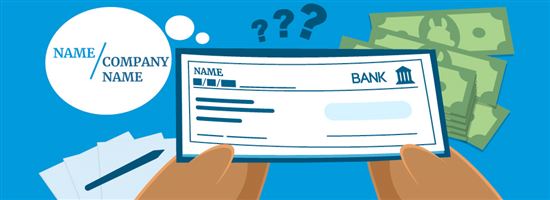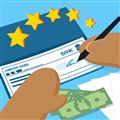Can You Use a Personal Checking Account for Business
Drawing a line between what's personal and what's business is good practice. Find out why a business account is the best option.
 |
Can You Use a Personal Checking Account for Business?
Sole proprietors and freelancers and their businesses are legally one entity. So, they can use a personal account for business.
LLCs and corporations are legally required to have a separate business checking account. This is because the business and owners are separate entities.
A business account provides better legal protection and credible finance management tools. The IRS highly recommends opening a business account for businesses. Even for sole proprietors.
Using a personal checking account for business is common among new business owners. Especially those who value the convenience of not having to create a new account. But in any case, it's in your best interest to work with separate accounts.
| Business structure | Need a separate business account? |
|---|---|
| Sole proprietorship | No |
| LLCs | Yes |
| General Partnerships | No |
| Limited and Limited Liability Partnerships | Yes |
| Corporations | Yes |
Business vs personal checking account
Business checking accounts typically offer more services and perks. These features make it easier to conduct business. Some accounts let you integrate with QuickBooks and other business tools. And you can offer employee access and debit cards.
Plus, businesses can grow their business credit and track their business expenses easily. But business checking accounts may have extra bank fees. Additionally, some banks will even put a cap on monthly transactions.
On the other hand, personal accounts often have fewer bank fees. But, at the cost of limited banking services. These accounts are typically used for paying bills. So, there aren't a lot of perks that can be used commercially.
A business account can give you protection for your business. It's a great option if you want to have an easier time during tax season.
Why You Shouldn't Use A Personal Account for Business
- It's a headache during tax time.
Keeping all your transactions in a single account is a recipe for trouble during tax time. It'll be a headache to trace back all your expenses and determine what they're for. And you may miss deductions. - It's not a great professional look.
To your customers and potential lenders, it could look like your business is not legit. That's because your personal account name—not your official business name—will be displayed when you transact with customers. This will cause some confusion. Your brand can also look unprofessional or, worse, not credible. - You can't obtain business services.
You also can't get important business tools. Some credit card services won't be accessible with your personal checking account. Having limited options for payment may drive some of your customers away. If you're trying to grow your business, it will be harder for you to apply for business loans.
Why Have A Business Checking Account
- It's great for separating expenses.
No one likes a mix-up.Having your finances in one place can lead to a financial disaster. Keeping a separate book helps with bookkeeping. It's also a great way to track your company's performance. Knowing your numbers can help you make informed decisions for your business.
- It creates a more professional look.
Professionalism is everything. You may be ready to turn your hobby into a full-fledged business. It's important your customers, banks, and the IRS recognize that. Instead of writing checks to your personal account, people can write them to your business name.Business bank accounts aren't just there to separate your money. They give the impression of credibility. They can help verify your business when you apply for a credit card or business loan.
Tip: To use an official business name, entrepreneurs must secure a doing business as (DBA) license. Also, have their business name approved by the state.[1] - It helps you build business credit.
Any business owner knows the importance of having a good relationship with your bank. Working on your business credit score can be important. Especially if you want to present bank statements to get credit. A business checking account won't significantly increase your score. But, it will help you develop a level of trust with your bank.Tip: Growing your business score takes more than just opening an account. You have to maintain a good account balance, stay within transaction limits, and pay bank fees on time. - It offers business tools.
Business accounts offer key services that non-commercial accounts don't. They can offer debit cards that can be distributed among a company's employees. Also, allow more than one person to have access to the company account. - It is necessary for business loans.
If you're looking to grow your business, a business checking account is a must. You can use bank statements to get business loans. This is money that you can invest back in your company. Having an account history with a bank also helps. - It gives you and your brand extra legal protection.
Having a business checking account offers legal protection for LLCs and corporations. The separation of accounts ensures that business problems don't affect your personal assets. You won't be personally liable for business debts or if your business gets sued.Read more: Why You Need a Business Bank Account
When is it OK to use a Personal Checking Account for Business
Using personal bank accounts is a great jumping-off point for new businesses. But in the long run, it is smarter to open a business checking account.
That being said, starting a new business can sometimes feel overwhelming. So it might be favorable for sole proprietors to stick to their personal accounts for the first few months. After all, finding the best institution to set up a new account can be difficult.
And chances are, you already have one that you're using anyway. So, opening another account might not be something you're interested in doing. It can also be hard to maintain a minimum balance when money doesn't roll in consistently yet.
When your business operations become more streamlined, then make the jump to business checking accounts. Especially if you're looking to hire employees or turn your hobby business into a full-time career.
Transitioning can be as straightforward as directing all payments or transactions to your new account. The adjustment period may come with a few bumps. But the peace of mind is well worth it.
FAQs
Do sole proprietors need a DBA?
If you want to conduct business using an official business name, you have to obtain a DBA certificate.
Getting a DBA is highly recommended for sole proprietors. Obtaining one earlier is better to make sure that you get the rights to the fictitious name. In many places, a DBA is required to start a business. Except for states like New Mexico, Alabama, Kansas, and Tennessee.
Getting one can help you legitimize your business. It is also a document needed to open a business bank account. DBAs are not cheap, and they can cost anywhere from $9 to $250. The price depends on which state you live in.
What documents do I need to apply for a business checking account?
Business checking accounts require more documents than personal ones. But that doesn't mean that getting one is impossible. If you're thinking of opening a business account, here's what you will typically need.
- State business registration forms
- DBA or fictitious name certificate
- Employer Identification Number (EIN) or SSN if you're a single proprietor
- Business license, articles of organization, or incorporation if you're an LLC or corporation
- Any state-issued ID
- Ownership agreements
Bottom Line
There's a lot more elbow grease that comes with opening a business account. But most experts agree that it's a safer bet than doing business through your personal account.
If you can afford the time and effort to open one, go ahead and do so. It's best to leave the business accounts for business and the personal accounts for personal expenses.
References
- ^ U.S. Small Business Administration. Choose your business name, Retrieved 6/2/2022
Write to Sabrina Go at feedback@creditdonkey.com. Follow us on Twitter and Facebook for our latest posts.
Note: This website is made possible through financial relationships with some of the products and services mentioned on this site. We may receive compensation if you shop through links in our content. You do not have to use our links, but you help support CreditDonkey if you do.
|
|
|





